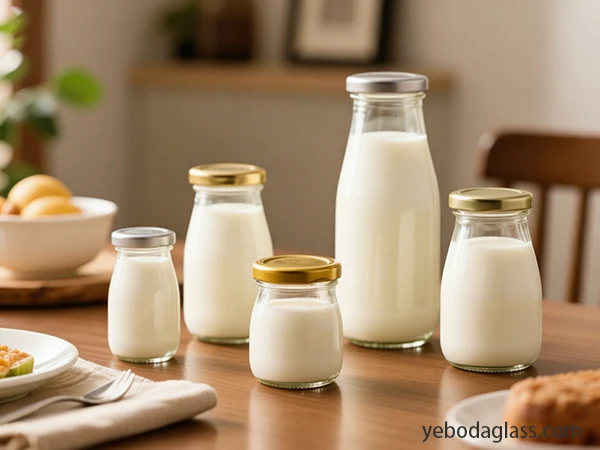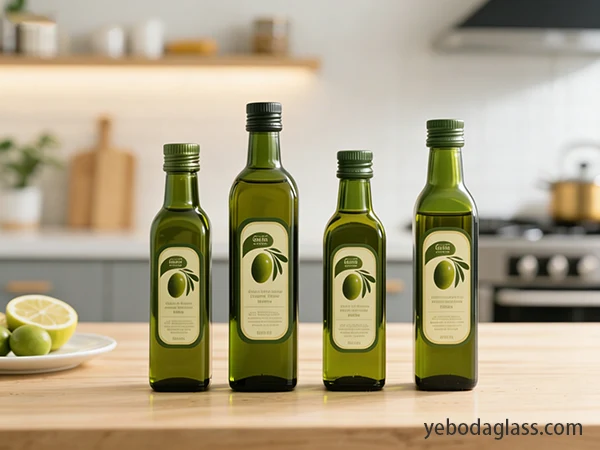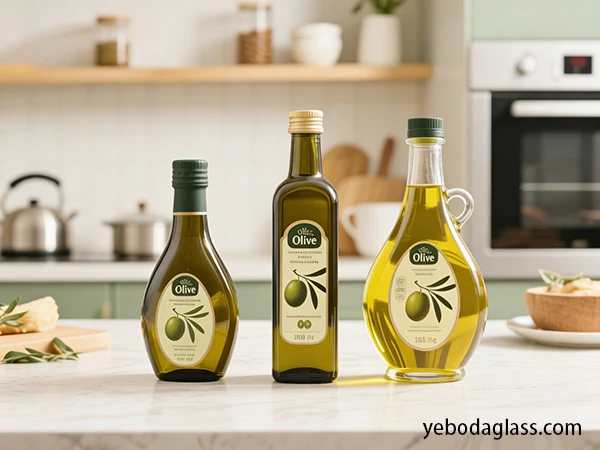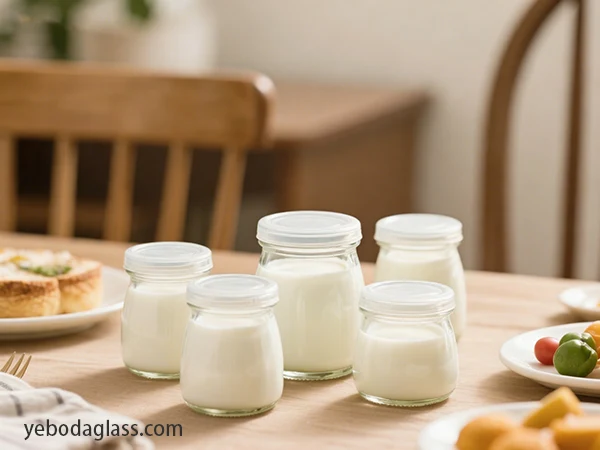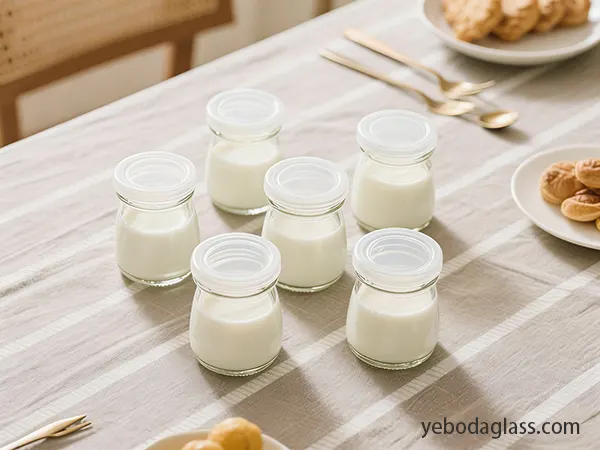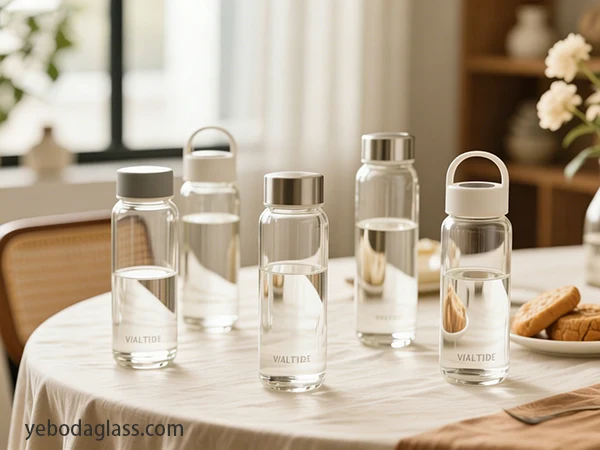مقدمة
أ مصنع زجاجات الزيت الزجاجية يُعدّ وصف المنتج بدقة وتفصيل، بالإضافة إلى عملية تقييم صارمة للموردين، عنصرًا أساسيًا لنجاح أي خطة استيراد. تُشكّل هذه الخطوة حجر الأساس الذي يُحدّد لاحقًا نجاح عمليات التوريد والخدمات اللوجستية والقدرة التنافسية في السوق على المدى الطويل. لا ينبغي أن يقتصر اختيار المصنع على طاقته الإنتاجية فحسب، بل يجب أيضًا مراعاة خبرته الفنية، وممارساته الصديقة للبيئة، ومصداقية شركائه. فالمصنع الجيد قادر على توفير إنتاج مستقر، وتطبيق لوائح السلامة، والقدرة على التوسع مع نموّ العمل.
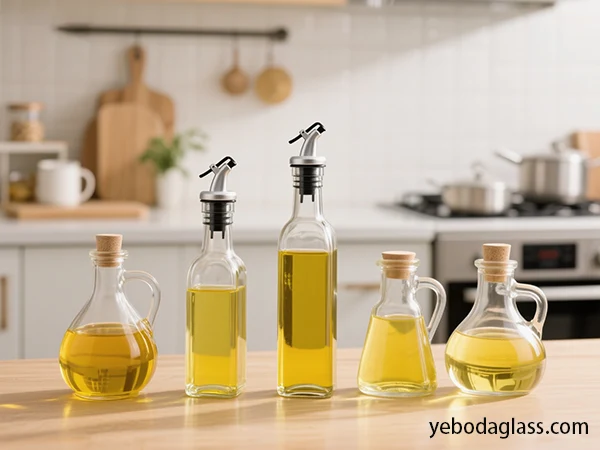
تحديد مواصفات زجاجات الزيت
توافق أنواع الزيوت وعلم المواد
يعتمد تركيب الزجاج بشكل أساسي على الخصائص الكيميائية للزيوت التي سيتم تعبئتها. قد تكون هذه الزيوت صالحة للأكل مثل زيت الزيتون أو زيت الأفوكادو، أو حتى زيوت عطرية أو مستحضرات تجميل أو مواد تشحيم.
- زجاج البوروسيليكات: لا يكاد يكون عرضة للتآكل الكيميائي وتغيرات درجة الحرارة، وبالتالي فهو مناسب تمامًا للزيوت العطرية والتركيبات الصيدلانية.
- زجاج الصودا والجير: بشكل عام، هي المادة الأكثر شيوعًا المستخدمة في زجاجات الزيت والمنتجات التجميلية، مما يجعل المنتجات النهائية أرخص وذات جودة ثابتة.
- زجاج العنبر: فهو يحجب الأشعة فوق البنفسجية التي يمكن أن تتلف الزيوت الحساسة للضوء مثل زيت الزيتون البكر الممتاز.
- زجاج باهت (شفاف): سيكون الأمر رائعًا إذا كانت العلامة التجارية تتطلع إلى عرض المنتج من خلال العبوة، لكنها لا توفر الحماية من الأشعة فوق البنفسجية.
لتحسين وظائف الحاجز، يستخدم بعض المنتجين عملية السيلنة أو الطبقات الداخلية لمنح المنتجات مزيدًا من الحماية وعمرًا أطول.
الأبعاد والأشكال وبيئة العمل
تتميز زجاجة الزيت المصممة بكفاءة عالية بدمج عناصر العلامة التجارية مع كفاءة التشغيل. تتراوح أحجامها عادةً من 250 مل إلى 1 لتر، ما يلبي احتياجات قطاعي التجزئة والصناعة. وتعتمد تشطيبات عنق الزجاجة على معايير GPI، مما يتيح إمكانية استبدال القطرات والمضخات والأغطية اللولبية. وقد يعكس شكل الزجاجة (مثل دوريكا أو ماراسكا) تفضيلات المستهلكين وكفاءة خط التعبئة. ويُعدّ تخفيف الوزن اتجاهًا هامًا في الوقت الحاضر، فهو لا يُحسّن استخدام المواد فحسب، بل يحافظ أيضًا على متانة المنتج، وبالتالي يساهم في خفض تكاليف الشحن والبصمة الكربونية مع الحفاظ على سلامة هيكل المنتج.
آليات الإغلاق وأنظمة التوزيع
إن اختيار طريقة الإغلاق يحدد كلاً من كيفية تفاعل المستخدم مع المنتج ومدى عمر المنتج:
- أغطية لولبية للزيوت الصالحة للأكل القياسية.
- رؤوس متحركة لزيت تجميلي أو زيت عطري يستخدم قطارة.
- يمكن أن تمنع فوهات الصب التسربات، وفي الوقت نفسه، تسهل التحكم في تدفق السائل.
- سدادات/فلين للتصاميم الحرفية أو الفاخرة.
من الضروري أن يتوافق كل غطاء تمامًا مع شكل عنق الزجاجة، وتوافق المواد، ولزوجة المنتج.
التصميم والعلامات التجارية المخصصة
من خلال تقنيات النقش والتلوين والتشطيب السطحي المخصصة، تستطيع العلامات التجارية تمييز عبوات زجاجاتها الزجاجية عن غيرها مع الحفاظ في الوقت نفسه على معايير السلامة والتغليف. تُعدّ الأسطح المستوية والمنحنية بسلاسة الأنسب للملصقات من حيث الثبات والمظهر، وهما عاملان بالغا الأهمية عند الرغبة في تسويق منتج في قطاع المنتجات الفاخرة.
معايير تأهيل الموردين
إن اختيار أفضل مصنع لإنتاج عبوات الزيت الزجاجية هو ما يحدد استقرار سلسلة التوريد بشكل عام. من الضروري تقييم القدرة الإنتاجية، والوضع المالي، والمبادئ الأخلاقية، والأداء البيئي.
القدرات التصنيعية والتكنولوجيا
من المتوقع أن تمتلك المصانع خطوط تشكيل آلية، وتقنيات تلدين متطورة، وإدارة دقيقة للغاية للقوالب. عادةً ما يستخدم مصنع زجاجات الزيت مثل مصنع يبودا معدات NNPB (الضغط والنفخ ذو العنق الضيق) المتطورة، مما يُمكّنه من تحقيق ليس فقط سُمك جدار موحد، بل أيضًا شفافية عالية.
مراقبة الجودة والشهادات
يُعدّ نظام إدارة الجودة المُدار بفعالية وفقًا لمعايير ISO 9001 أساسًا للأداء المستقر على المدى الطويل. ومن الأهمية بمكان أيضًا ضمان امتثال عبوات الزيوت الصالحة للأكل للوائح الملامسة للأغذية (FDA، LFGB، EU 1935/2004). يتبع مصنع نموذجي لتصنيع زجاجات الزيت نظامًا صارمًا من الفحوصات والتفتيشات، ليس فقط للمواد الخام، بل أيضًا للإجهاد الحراري، ومقاومة التسرب، وتجانس الوزن.
الاستقرار المالي والممارسة الأخلاقية
المصانع ذات الوضع المالي الجيد هي التي تضمن إمدادًا مستقرًا بالمنتجات. إن الالتزام بالمعايير الأخلاقية، والذي يمكن التحقق منه من خلال عمليات تدقيق BSCI أو Sedex، لا يُحسّن صورة العلامة التجارية فحسب، بل يُقلل أيضًا من مخاطر الإضرار بسمعتها. على سبيل المثال، تُعدّ شركة Yeboda مثالًا واضحًا على الإدارة الأخلاقية الممتازة والشفافية التامة في عمليات إنتاجها.
التوريد الاستراتيجي واختيار المصانع: ميزة يبودا
يتجاوز مفهوم التوريد الاستراتيجي مجرد المساومة على الأسعار؛ فهو تقييم شامل للأداء والمرونة والاستدامة. ونتيجة لذلك، قد يكون العثور على شريك مثالي من مصانع زجاجات الزيت، مثل شركة يبودا، مفتاحًا لتحقيق وفورات طويلة الأجل في التكاليف وضمان استقرار سلسلة التوريد.
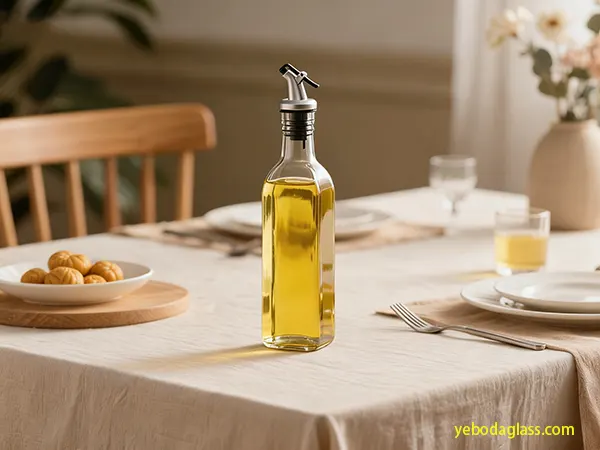
عملية التوريد الاستراتيجي
أبحاث السوق وتحديد الموردين
تُشكّل مراكز التصنيع الرئيسية في العالم، بما فيها الصين والهند وأجزاء من أوروبا الشرقية، ملامح سوق الزجاجات. وتتمثل مصادر المعلومات للعثور على مصانع منافسة في منصات التجارة الإلكترونية (مثل علي بابا وميد إن تشاينا) والمعارض الصناعية.
إجراءات طلب المعلومات وطلب العروض
تبدأ عملية الشراء بطلب معلومات (RFI) يهدف إلى تقييم إمكانيات المورد. ثم تنتقل إلى طلب عروض أسعار (RFP) للحصول على عروض أسعار للأنشطة المخطط لها. تتيح أسس طلب عروض الأسعار إجراء مقارنة دقيقة بين مختلف الموردين الذين يقدمون عروض أسعار لمصنع زجاجات الزيت الزجاجية المطلوبة.
التقييم الفني والتجاري
يجب أن تشمل التقييمات توافق المواد، وأساليب الإنتاج، وجودة الأدوات. ويتضمن التحليل المالي تكلفة الوحدة، ونفقات الخدمات اللوجستية، والتعريفات الجمركية المحتملة، مما يضمن شفافية التكلفة الإجمالية النهائية.
تقييم المصنع وقدرة الإنتاج
تتضمن عملية تدقيق مصنع زجاجات الزيت مراجعة تقنية الأفران، ودقة التشكيل، والتحكم في عملية التلدين، وأنظمة فحص الجودة. توفر المصانع المزودة بأجهزة فحص بصري وخطوط رفض آلية جودة فائقة وتناسقًا أعلى ومعدلات عيوب أقل.
عوامل تحسين الكفاءة في مصنع زجاجات الزيت
الكفاءة في التكلفة
تُعدّ وفورات الحجم السبب وراء إمكانية خفض الأسعار لمنافسة أسعار المنافسين. فعلى سبيل المثال، تستخدم شركة يبودا نطاقًا واسعًا من الأتمتة وعمليات تشغيل الأفران المُحسّنة لتحقيق تكلفة منخفضة للوحدة مع الحفاظ في الوقت نفسه على مستوى عالٍ من الجودة.
الموثوقية والاتساق
يلتزم مصنع زجاجات الزيت الأكثر تنافسية بتسليم البضائع في الوقت المحدد، وضمان ثبات جودة الدفعة، بالإضافة إلى قيامه بأنشطة تواصل استباقية ضرورية لكسب ثقة العملاء على المدى الطويل.
القيادة في مجال الاستدامة
إن المصانع التي تدفع ثمن ذلك من خلال استخدام الأموال في إعادة تدوير الزجاج المستعمل وتركيب أفران صديقة للبيئة، مثل تلك الموجودة في النظام البيئي العالمي لزجاجات الزيت، هي التي أصبحت المنتجين الأكثر مسؤولية.
تحسين الخدمات اللوجستية وتنسيق سلسلة التوريد
إنّ الخدمات اللوجستية الجيدة هي التي تحوّل علاقة قوية مع الموردين إلى أرباح تجارية حقيقية وقابلة للقياس. ولا يمكن لاستراتيجية استيراد فعّالة لزجاجات الزيت أن تنجح دون تنسيق دقيق لأوقات التسليم والتخزين وإدارة التكاليف.
أساليب الشحن وتخطيط المسارات
تحسين الشحن البحري
يُعدّ تجميع الشحنات في حاويات كاملة (FCL) الخيار الأمثل لشحن عبوات الزيت المعبأة في حاويات، وذلك لتوفير تكاليف نقل الوحدة الواحدة. كما يُسهم اختيار المسارات المباشرة في تقليل مخاطر إعادة الشحن والتأخير.
النقل والتوزيع الداخلي
إن الجمع بين النقل بالسكك الحديدية والنقل النهري للتوصيل الداخلي ليس مجرد طريقة لتحقيق وفورات أكبر في التكاليف فحسب، بل هو أيضًا وسيلة لتقليل انبعاثات الكربون.
مزامنة المخزون والطلب
يُعدّ التنبؤ الدقيق بالطلب إجراءً وقائيًا لمنع نفاد المخزون وتكدسه. ويؤدي توافق التوقعات بين المشتري ومصنع زجاجات الزيت إلى إنتاج متزامن ودورات إعادة تزويد قابلة للتنبؤ.
أدوات رقمية لتعزيز الظهور
يؤدي إدخال منصات تخطيط موارد المؤسسات وإدارة سلسلة التوريد إلى تحسين هائل في شفافية عمليات تنسيق العملاء واتخاذ القرارات بفضل الوصول في الوقت الفعلي إلى المعلومات المتعلقة بحالة الطلب وتتبع الشحنات والوثائق الجمركية.
تحليل التكاليف وتحسين التكلفة الإجمالية النهائية
يظل فهم التكلفة الإجمالية للاستيراد (TLC) هو النقطة الرئيسية في تحديد ما إذا كان استيراد زجاجات زجاجية سيكون مربحًا حقًا.
مكونات التكلفة
تكاليف التصنيع
سعر الوحدة، واستهلاك تكلفة العفن، ورسوم فحص الجودة.
تكاليف الشحن والجمارك
الشحن البحري والتأمين والمناولة في الموانئ والتعريفات الجمركية بموجب رمز النظام المنسق الصحيح (على سبيل المثال، 7010.90).
التكاليف الخفية
غالباً ما يتم تجاهل تكاليف التخزين وإعادة العمل المتعلقة بالجودة والتكاليف الإدارية في الحسابات التقليدية.
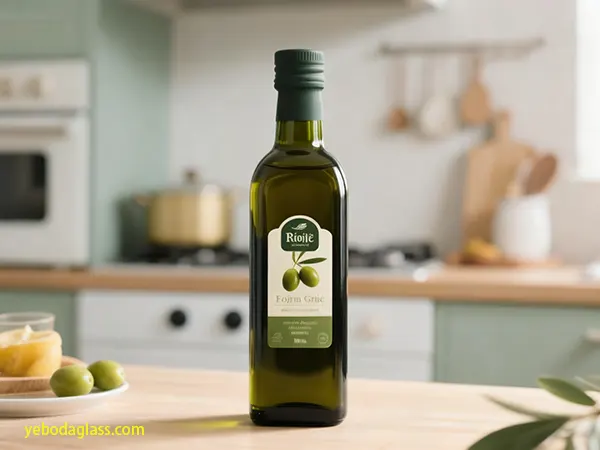
خصومات الكميات الكبيرة ووفورات الحجم
يمكن أن تؤدي طلبات الشراء بالجملة من مصنع واحد لزجاجات الزيت إلى خصومات تصل إلى 20-25%. هذا التحسن في هامش الربح كبير بما يكفي للسماح بالتسعير وفقًا لسعر السوق، مما يدعم القدرة التنافسية.
الامتثال التنظيمي وتخفيف المخاطر
يتعين على المستورد الدولي لزجاجات الزيت اتباع العديد من الأطر القانونية، وفي الوقت نفسه، إدارة مخاطر الإمداد بطريقة استباقية.
الأطر التنظيمية
يضمن الالتزام باللوائح العالمية المتعلقة بتلامس الأغذية والبيئة والتعبئة والتغليف سلامة المنتج وإمكانية وصوله إلى السوق. أما عدم الالتزام فيؤدي إلى رفض المنتج أو سحبه من السوق، وهو ما قد يكون مكلفاً.
إدارة المخاطر
مخاطر الجودة
يتم تحقيق التخفيض من خلال إجراء عمليات فحص ما قبل الشحن (PSI) ووضع معايير AQL.
مخاطر الخدمات اللوجستية
يمكن أن تساعد تدابير مثل الحفاظ على مخزون احتياطي، واستخدام شركات نقل متنوعة، ومراقبة الشحنات في الوقت الفعلي في تخفيف مشكلة مخاطر الخدمات اللوجستية.
الاعتماد على الموردين
من المستحسن وجود مصادر إمداد مزدوجة ووضع خطة طوارئ للمنتجات الأكثر أهمية.
التوريد المستدام والمسؤولية البيئية
أصبحت مسألة الاستدامة عاملاً تنافسياً مهماً في صناعة زجاجات الزيت.
تقييم الأداء البيئي
شركاء المنشأة هم أولئك الذين حصلوا على شهادة ISO 14001، ويستخدمون أفرانًا موفرة للطاقة، وقاموا بتنفيذ إعادة تدوير الزجاج المكسور.
مواد وتغليف مستدامة
إن التركيز على محتوى إعادة تدوير الزجاج، وتقليل وزن المنتج، واستخدام الكرتون الصديق للبيئة يتماشى مع اتجاهات التغليف الأخضر.
خفض انبعاثات الكربون في الخدمات اللوجستية
ينبغي إعطاء الأولوية للشحن البحري، وخطوط الشحن المباشرة، والعمل مع شركات النقل المحايدة للكربون.
التنفيذ الاستراتيجي والتحسين المستمر
إن مبدأ التميز في التنفيذ هو ما يميز مجرد التخطيط عن النجاح القابل للقياس.
خارطة طريق عملية الاستيراد
صياغة اتفاقيات التوريد الرئيسية التي تتضمن بنودًا تتعلق بالجودة والتسعير والتسليم وحقوق الملكية الفكرية. تطبيق اتفاقيات مستوى الخدمة لقياس أداء الخدمات اللوجستية.
إطار ضمان الجودة
ابدأ الإنتاج على العينات (PPS) وعمليات فحص العينة الأولى (FAI) ومراقبة الجودة المنتظمة أثناء العملية (IPQC) للحفاظ على جودة كل شحنة من كل مصنع ينتج زجاجات الزيت الزجاجية.
مقاييس الأداء القائمة على البيانات
قم بتسجيل مؤشرات الأداء الرئيسية مثل التسليم في الوقت المحدد، ومعدل العيوب، وإجمالي تكلفة الشحن. يُعد التحليل المستمر للبيانات المحرك الرئيسي لتحسين العمليات التشغيلية.
الابتكار وتكامل التكنولوجيا في مصنع زجاجات الزيت
تُغير الرقمنة نموذج العمل الخاص بمصنع زيت الزجاج.
الأتمتة والتصنيع الذكي
ولتحسين الكفاءة، تقوم المصانع بتركيب أنظمة مدعومة بالذكاء الاصطناعي للتفتيش، وأنظمة روبوتية للتعبئة على المنصات، واستخدام الصيانة التنبؤية.
إمكانية التتبع عبر إنترنت الأشياء وتقنية البلوك تشين
يمكن أن يؤدي استخدام أجهزة استشعار إنترنت الأشياء جنبًا إلى جنب مع تقنية سلسلة الكتل إلى تحسين عملية التتبع وضمان الجودة - وهذه ميزة يمكن أن تكون مفيدة للغاية للزيوت الصالحة للأكل أو التجميلية عالية الجودة.
التكيف مع السوق والرؤى التنافسية
إن المعرفة العميقة والمرنة بتطور السوق بمثابة ضمانة للبقاء على المدى الطويل.
اتجاهات المستهلكين
يتزايد إقبال العملاء على العبوات الصديقة للبيئة والجذابة بصريًا. ويمكن للعلامات التجارية التي تستخدم مصانع زجاجات الزيت الزجاجية الرائدة في مجال الاستدامة والابتكار أن تتميز ليس فقط بسجلها البيئي المتميز، بل أيضًا بتصميم عبواتها.
المقارنة المعيارية التنافسية
تتيح دراسة منتجي زجاجات الزيت العالميين اكتشاف الثغرات المحتملة في الابتكار ووضع معايير في التعبئة والتغليف من خلال مقارنة الذات بالشركات الرائدة.
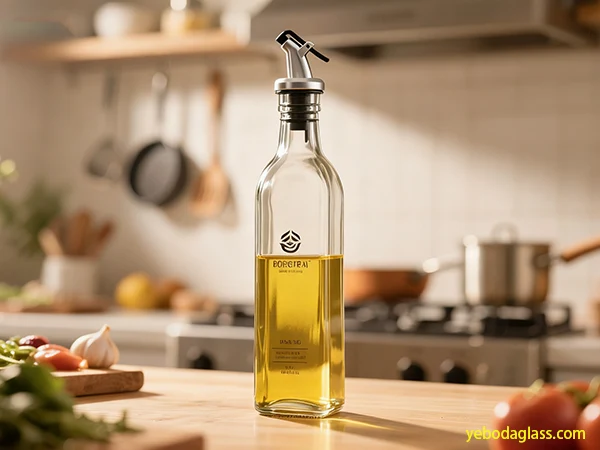
خاتمة
إن اختيار وإدارة علاقات مصانع زجاجات الزيت الزجاجية بعناية فائقة خطوة استراتيجية تتجاوز مجرد التوريد. فهي تشمل، من بين أمور أخرى، جوانب التصميم، والتصنيع المستدام، وتحسين العمليات اللوجستية، والتطوير المستمر. إن بناء علاقة متينة قائمة على الشفافية، واحترام البيئة، والتقدم المتبادل، هو ما يؤدي إلى معايير عالية ومتسقة، فضلاً عن تحقيق ميزة تنافسية في السوق. وسواءً كان الأمر يتعلق بزجاجات الزيت الزجاجية، أو الزجاجات بشكل عام، أو زجاجات الزيوت المتخصصة، فإن السر يكمن في رعاية علاقات الموردين، المدعومة باستراتيجية قائمة على البيانات، والامتثال للوائح، والتميز في الاستدامة، على المدى الطويل. في هذا السوق العالمي المتغير، لن يكون المستوردون الذين يواكبون مصانع زجاجات الزيت الزجاجية ذات الرؤية المستقبلية والكفاءة البيئية روادًا في الأداء من حيث التكلفة فحسب، بل سيحققون أيضًا مصداقية العلامة التجارية والمسؤولية البيئية على المدى الطويل.

